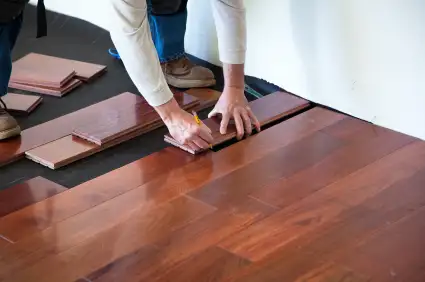Is it time to replace your hardwood floor? Are you feeling overwhelmed by the process of choosing both a new hardwood flooring and a contractor/installer for the job? Don’t fret. Here are the steps you should take to ensure that you get the most cost-effective hardwood flooring for your budget as well as the most reliable wood floor installer in your area.
Hardwood Floor Installation Service
in Los Angeles
1. Do your Due Diligence: Research on Hardwood Floor Installer or Hardwood Floor Installation
Too many homeowners immediately start calling installers without the least idea of the choices involved or what to look for in a hardwood flooring company. Some homeowners even cold-call hardwood floor installers from the phone book. You need to start your hardwood flooring project by familiarizing yourself with basic hardwood flooring installation considerations, so your coming into the game with ample amount of information and hardwood flooring terminologies.
You don’t need to know everything and become a certified wood floor installer. What you should do is make a list of informed questions to ask prospective hardwood floor contractors. Asking the questions below will help you learn which hardwood flooring is best for your home and will also help you to identify contractors with whom you can easily communicate.
Part of your research should also focus on the pros and cons for various type of hardwood floors, such as solid hardwood floor, engineered hardwood floor or laminate and parquet flooring. To read more about types of hardwood floors, read this article about different types of hardwood floor.
Finally, look for useful details, tips, and common problems associated with residential hardwood flooring. Know how to immediately spot water leaks that can cause water damage for example. Know what wood specie will be best for your preferred hardwood flooring stain, which kind of hardwood flooring is easier and cheaper to install, but is still within your design and lifestyle preference.
You should also find out everything you can about your old hardwood floor. When was it installed? What type of hardwood floor do you have? Is the sub-floor leveled? Is there an existing termite or water damage that needs t be addressed first? Knowledge is power.
Initial Questions to Ask Local Hardwood Floor Installer / Contractor
- What type of hardwood floor is best for your local climate? Why?
- What kind of wood floor would you choose for your home? Why?
- Which method of hardwood floor installation is best for your home.
- What type of hardwood flooring will have the greatest potential to save you money and will be suitable for your lifestyle?
- Is the hardwood flooring installer experienced, licensed, insured and bonded?
- What type of hardwood floor services do they think they excel? Ask for referrals?
2. Solicit Hardwood Flooring Estimates
These are just a few of the possible questions you might ask a hardwood floor installer during preliminary phone conversations or face-to-face when you are soliciting wood flooring estimates. At this point, you should have a pretty good idea of the kind of hardwood floor you want. This a way, you can make apples-to-apples comparison of different estimates. Conventional wisdom suggests that you get at least three estimates.
Guidelines for Soliciting and Reviewing Estimates
- Be wary of estimates that are significantly higher or lower than the rest. Go back and ask questions to determine the cause of this discrepancy. Make sure that you consider the following: Quality of materials that they will use (eg: brand and kind of wood flooring, finish and other materials), skill level of the hardwood floor installer, and the credibility of the hardwood floor contractor (are they licensed?)
- Don’t assume that the lowest bid offers inferior quality or that the highest bid means superior quality. If you can’t identify which contractors are offering the best overall value, you need to do more research, talk to more previous customers, and ask more questions.
- This is your last chance to change your mind. Don’t be afraid to solicit more estimates for different hardwood flooring services.
3. Choose a Hardwood Floor Installer and Sign a Service Contract
Once you’ve had a chance to talk to each of your prospective installers, it’s time to review the estimates and sign a service contract. Sometimes the right answer will jump out at you – one contractor in particular seemed to share your hardwood floor vision, philosophy, and budgetary constraints. Often, two contractors seem to make comparable offers with impeccable credentials. In this case, you may need to take a second look and split hairs. Just don’t underestimate the importance of communication; finding a contractor who is easy to communicate with is valuable in the long run. And don’t just read, but make sure you clearly understand the implications of the service contract.
Items a Service Contract Should Address
- The length and terms of the labor warranty. Hardwood Floor manufacturers generally include product warranties, but these warranties may not mean much if problems result from the installation. A typical labor warranty may last two years, but you should make sure the product warranty will remain valid after the labor warranty has expired.
- A payment schedule. Never pay for the entire project upfront. Generally speaking, payment should occur in installments and parallel the work as it is being completed.
- Job Description. Service contracts should be indicative, clear and specific on what work will be done and which area would worked on and how much will be the total cost. Make sure that you are agreeing on a final price. You wouldn’t want any hidden charges jumping on you at the end of the installation process.
- A timeline. Weather permitting, the service contract should lay out a schedule for the project. In particular, make sure the hardwood floor installer is responsible for any damage that occurs during the project. A reputable NJ flooring company should have means to protect your home while the hardwood floor is being installed.

